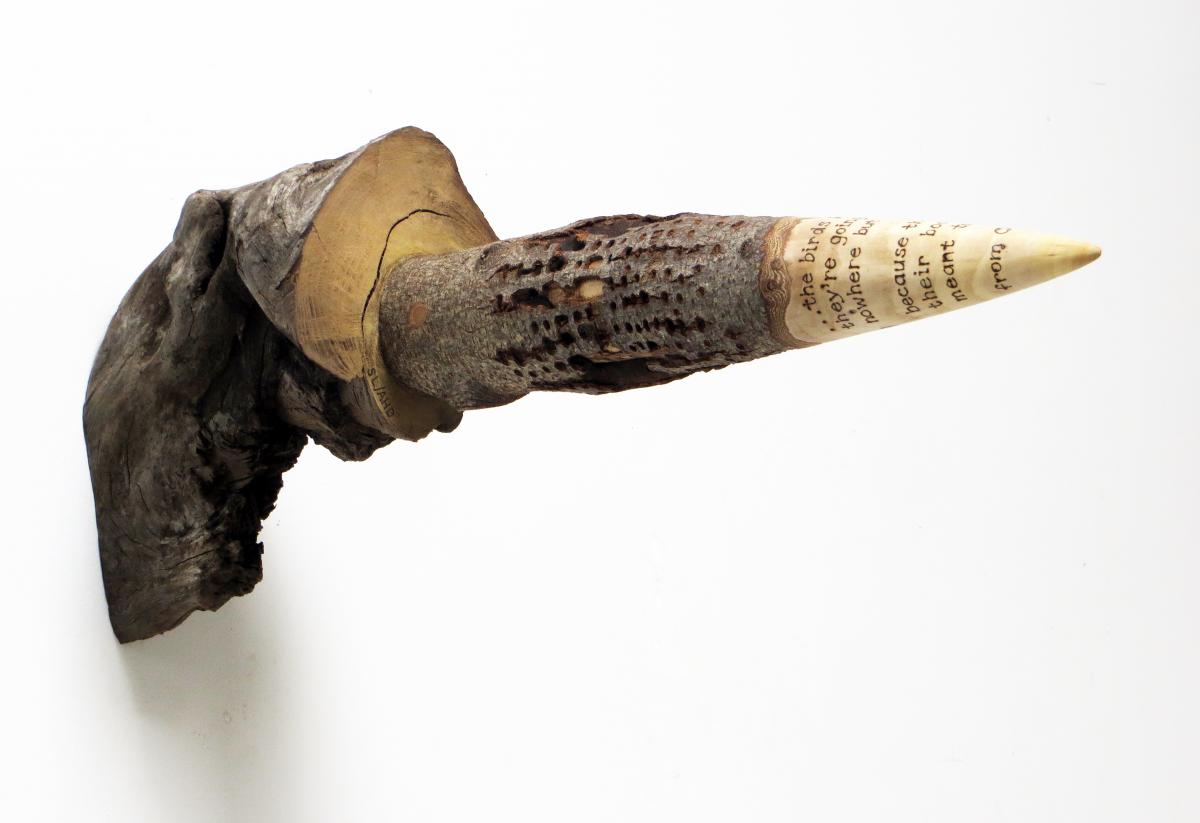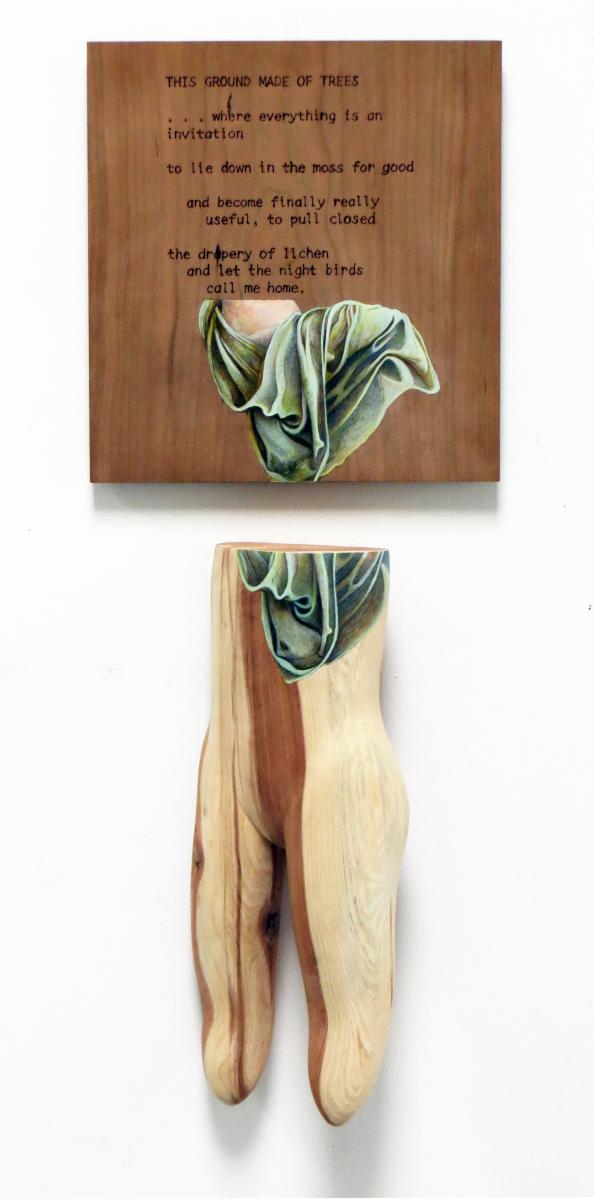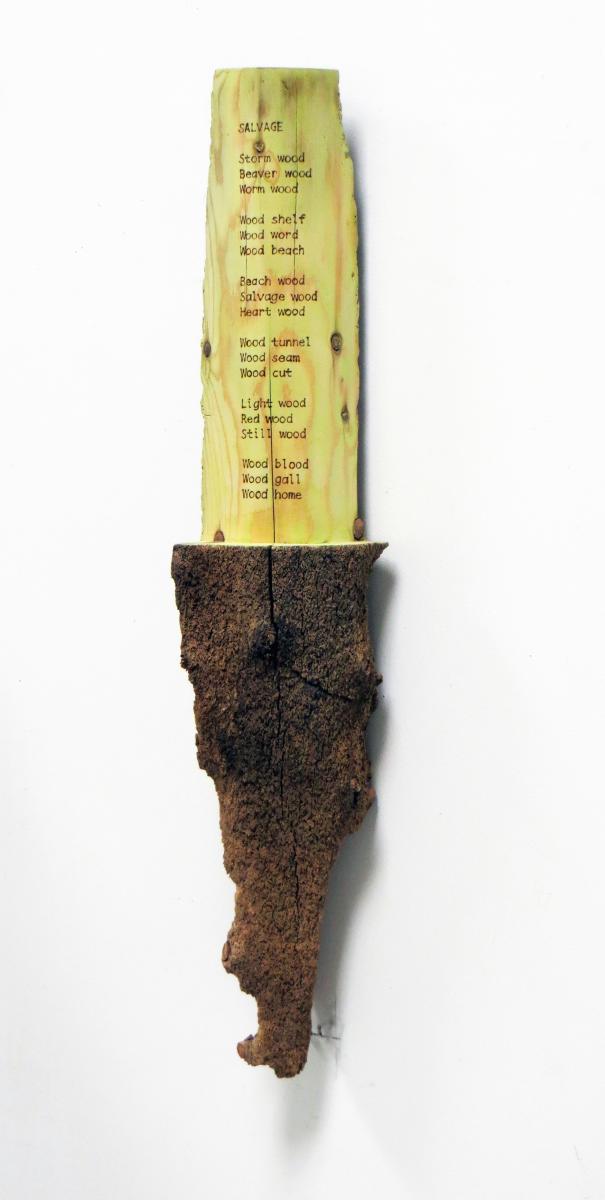Alison Deming, (UA Regent’s Professor of Creative Writing and Agnese Nelms Haury Chair in Environment & Social Justice) and Susan Lyman (longtime friend and sculptor based in Provincetown MA, and part-time winter resident of Tucson) are participating in the exhibition “Breath and Matter: Poet/Sculptor Collaborations” at Boston Sculptors Gallery in Boston MA from July 18 - August 12, 2018. The 24 collaborating teams took on the challenge of the question posed by Robert Pinsky, “What has art made of breath to do with an art made of matter?”
The pair of artists together explore the plastic relationship between wood and words as the material of their artistic practice. They take their cue from John Fowles' The Tree: "the real subject of this arboreal excursion is not the trees at all, but the importance in art of the unpredictable, the unaccountable, the intuitive, the not discernibly useful." Trees here serve as found material, metaphor and means of being present.
If you can't make it to the exhibit in Boston, they were kind enough to share some of their collaborative art with us.

CASTALIA
Alison Hawthorne Deming
1
during my darkest grief the forest
was like an open sea birch trees
the beacon I used to steady my position
my brain felt at home among
saplings that tangle seeking light
that part of the soul Aristotle thought
we held common with plants
days and weeks cutting trail
at first moving three feet
through thicket then ten then
deeper into black spruce
bow saw and clippers
slung on my back like
Diana’s quiver trying to sense
how the path should rise
past cobble and copse
into high fern meadow
and beyond into balsam fir
towering so high they make
beneath them a living room
of reindeer moss and fungi
woods long worked by men
timbers and fieldstones
oxen-hauled downhill even
the skins of island houses
cloaked with fish scale
of cedar shingles cut here
where hardly a cedar tree
can be seen so fruitful
were those times of building
the Greeks had a way to speak
about depth so that each spring
had a name and history
and a supplicant had a place
to go to beg for wisdom
or healing or a song to make
that part of the soul
held in common with song
feel at home North Head
Seal Cove Dark Harbour
do well for singing but
every place needs its Castalia
where older thought
emerges like steam
from vents in a caldera
2
the island lies under a pall
of cold rain sea churlish
and aluminum gray
white caps slapping
horizon dissolved
no edge just one waving
continuity of libidinous water
two bald eagles feed along shore
rain means nothing to them
cold means nothing to them
fish mean everything
the birds rise from below the long bank
return to woods their wings
sated and slow gulls wobble
their wings at home in raucous
air the birds know where
they’re going which may be
nowhere but they keep going
because that is what
their bodies are made to do
rain means something
to mosses they puff up
put on velvet suits and shine
like green carpet movie stars
rain means something
to mushrooms each cap
smaller than a push pin
constellations forming
overnight the forest floor
lighting up from below
rain means something to deer
they lie down in fern meadows
under tall birches it means
nothing but cold to lobstermen
who motor out haul traps
dawn and dusk rain means something
to songbirds who clam up
when it starts and when it stops
renew their lease on songful sky
3
thwack of the driver as it slams
sledge against stake
to anchor the weir stakes
men working on floating raft
rhythmic thunks
as they breach ocean floor
birch saplings lashed for top posts
evening the boats come
home the bay silken calm
wisps of fog drift over
brittle grass pheasant
swift robin even gulls
tuck their cold feet
under downy bellies
glide toward sleep
ENCOUNTERING TREES

Alison Hawthorne Deming
Old birches lead complicated lives.
One falls in a gale then lying on its side
feels sun on its bark and begins
a new branch that becomes a trunk
and rises. Another grows a knee
for support after wind has made
it kneel. One grows an elbow to recline on
as it descends from vertical to horizontal.
Another grows a looping branch
like the curve in a jump rope
turning an obstacle into
a gesture of architectural grace.
But the grandmother tree is the marvel
sprawling like an opulent carefree queen
trunk split in the center like a woman’s cleft
the gap sending side branches out to snake low
until they reach beyond the canopy
to find enough light to ascend.
A tree that is a community of trees
a tree that refuses damage
turning storm and infestation
into a form that holds its ground
and grows stronger for all it suffers.
Grandmother tree, teach me, hold me,
protect me. I have walked through
a dark forest, red needled floor
lit with ghost flowers. Indian pipes
we used to call them as if to see them
is to hear the land’s indigenous music.
At dawn I sat on a rotted log and read
The New York Times on my smart phone,
America still going to the mean dogs,
while squirrels scolded, chickadees
fed in a noisy mob among spruce boughs,
bald eagle chittered from somewhere
out of sight. What is it to endure but
to feel the cadence of uncertainty
accepted as the condition for growth?
THIS GROUND MADE OF TREES

October 2008, H.J. Andrews Experimental Forest
Alison Hawthorne Deming
The giants have fallen.
I think I can hear the echo
of their slow composition
the centuries passing
as note by note
they fall into the forest’s
silent music. Moss has run
over their backs, mushrooms
have sprung from the moss,
mold has coated the fungal caps
and the heartwood
has given itself to
muffled percussion
of insect and microbe
that carpet of sound
that gives the forest its rhythm.
A nuthatch twits
or a vole cheeps.
The scent of decay rises
like steam from a stewpot.
Anywhere I set my foot
a million lives work
at metabolizing
what has gone before them.
The day is shortening
and the winter wrens have
something to say about that.
I can almost give thanks
that the soil will claim me
but first allow me, dear life,
a few more words of praise
for this ground made of trees
where everything is an invitation
to lie down in the moss for
good and become finally really
useful, to pull closed
the drapery of lichen
and let the night birds
call me home.
SALVAGE

Alison Hawthorne Deming
Storm wood
Beaver wood
Worm wood
Wood shelf
Wood word
Wood bench
Beach wood
Salvage wood
Heart wood
Wood tunnel
Wood seam
Wood cut
Light wood
Red wood
Still wood
Wood blood
Wood gall
Wood home
Deming is the author of five books of poems, most recently Stairway to Heaven (Penguin, 2016) and four books of essays including Zoologies: On Animals and the Human Spirit (Milkweed, 2014). She is Regents' Professor and Agnese Nelms Haury Chair in Environment and Social Justice at the University of Arizona.
Lyman is a sculptor, painter and teacher who has made her home and raised her family in Provincetown MA since her fellowship at the Fine Arts Work Center in 1981. She is represented by AMP Gallery in Provincetown, and Boston Sculptors Gallery, where she recently had her third solo show, “Sculpture in the Unmaking.”

